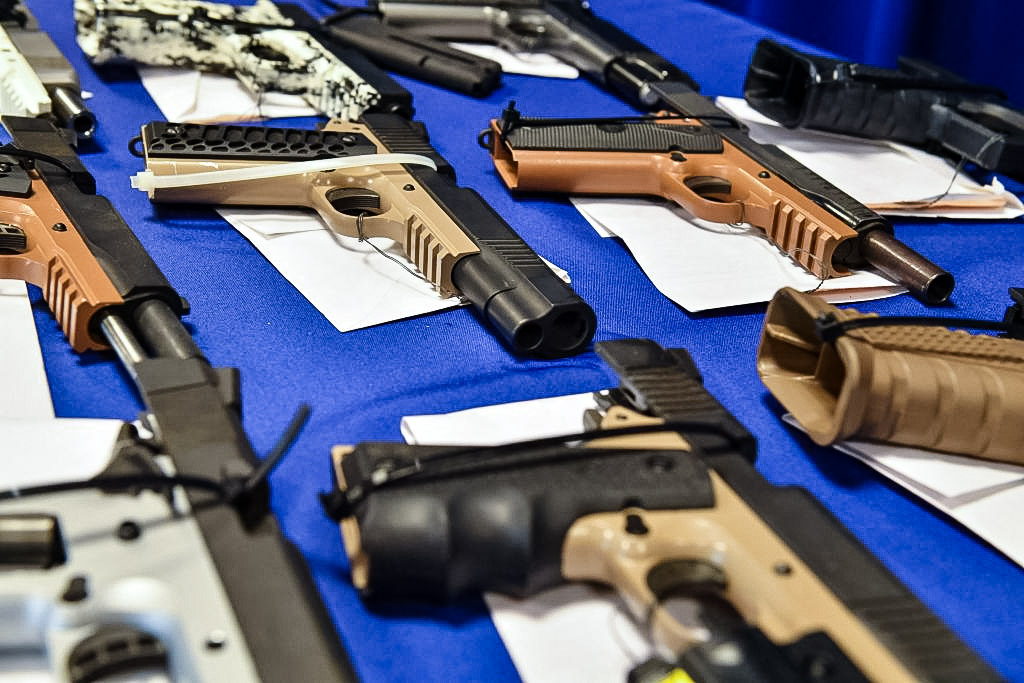The DOJ is asking the Supreme Court to overturn a lower court decision that held the ATF misinterpreted a federal gun control law.
The Supreme Court is set to hear oral arguments on Oct. 8 over so-called ghost guns and whether the Bureau of Alcohol, Tobacco, Firearms, and Explosives (ATF) exceeded congressional authorization when it issued regulatory guidance aimed at preventing their production.
“Ghost guns” are generally understood to be untraceable firearms that lack serial numbers and are provided by a source other than someone licensed to do so.
In 2022, the Biden administration attempted to crack down on their proliferation by implementing an ATF rule that interprets a longstanding federal law—the Gun Control Act (GCA) of 1968—as applying to certain weapons kits, as well as items used to produce frames and receivers.
Two Texas residents—Jennifer VanDerStok and Michael Andren—along with Tactical Machining, a producer and retailer, and the Firearms Policy Coalition sued the ATF. In June 2023, a district court in Texas granted them a preliminary injunction.
Although they won at the district and appeals court levels, the U.S. Supreme Court twice lifted a lower court’s block on the rule. The U.S. Court of Appeals for the Fifth Circuit eventually held that the ATF had misinterpreted the law.
The Department of Justice (DOJ), led by the U.S. solicitor general, is asking the Supreme Court to reverse the Fifth Circuit’s decision, saying it erred in holding that the ATF regulation misinterpreted federal law.
Defining ‘Firearm’
The case will likely be one of the most observed for the 2024–25 term as it touches on a conflict between the right to self-defense and what the DOJ suggests is a growing public safety issue. It follows the Supreme Court’s rejection of another ATF rule that it said misinterpreted federal law by banning bump stocks.
“If left in place, the Fifth Circuit’s decision would give the manufacturer and distributer respondents the green light to resume unfettered distribution of ghost guns without background checks, records, or serial numbers,” the solicitor general told the Supreme Court in a February brief. “That would pose an acute threat to public safety.”
The case, known as Garland v. Vanderstok, centers on the definition of “firearm” that Congress wrote into the GCA when it passed the law in the wake of President John F. Kennedy’s assassination.
It defines regulated firearms as “(A) any weapon (including a starter gun) which will or is designed to or may readily be converted to expel a projectile by the action of an explosive; (B) the frame or receiver of any such weapon.”
The DOJ, which houses the ATF, is tasked by the legislation with prescribing regulations to enforce it. In 2022, the Biden administration attempted to do so by redefining firearms to include weapons parts kits that “may readily be converted, assembled, restored, or otherwise converted to expel a projectile by the action of an explosive.”
Although the GCA didn’t define “frame or receiver,” the ATF’s new regulation attempted to describe it as a “partially complete, disassembled, or nonfunctional frame or receiver.”
The Supreme Court has decided to address both of these definitions.
‘Readily Be Converted’
Vanderstok and her co-respondents told the Supreme Court that the ATF’s definition isn’t logical and that the agency is attempting to regulate items that aren’t frames or receivers.
“Simply put, if an item potentially could be made into a frame or receiver but is not a frame or receiver, that item is not a ‘firearm’ under the Act’s plain text,” Vanderstok said in a brief to the justices.
The brief quoted the Fifth Circuit in stating that a “part cannot be both not yet a receiver and a receiver at the same time.”
It also disputed the idea that the ATF could use the “readily be converted” language from the first part of the GCA’s definition and apply it to another part of the definition—frames and receivers.
The DOJ said that its reading is better since the Fifth Circuit’s interpretation would “thwart the [GCA’s] careful design.” It said that the law “lacks any language specifying that a ‘frame’ or ’receiver‘ must be ’complete,‘ ’operable,‘ or ’functional.’”
“Nor does ordinary usage support reading those missing adjectives into the Act,” the DOJ said.
Its petition to the Supreme Court likened guns to IKEA furniture and bicycles. IKEA, it said, could not avoid a tax on the sale of home goods if it claimed to merely sell furniture parts kits rather than furniture.
“A bicycle is still a bicycle even if [it] lacks pedals, a chain, or some other component needed to render it complete or allow it to function,” it said. “So too if the bicycle is shipped with plastic guards attached to the gears or brakes that must be removed before operation, or with a seat tube that the user must cut to length before installing.”

